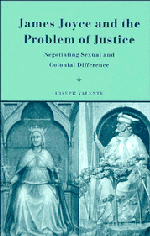Book contents
- Frontmatter
- Contents
- Preface
- Acknowledgments
- List of abbreviations
- 1 Justice unbound
- 2 Joyce's sexual differend: an example from Dubliners
- 3 Dread desire: imperialist abjection in Giacomo Joyce
- 4 Between/beyond men: male feminism and homosociality in Exiles
- 5 Joyce's siren song: “Becoming-woman” in Ulysses
- Epilogue: trial and mock trial in Joyce
- Notes
- Index
5 - Joyce's siren song: “Becoming-woman” in Ulysses
Published online by Cambridge University Press: 08 January 2010
- Frontmatter
- Contents
- Preface
- Acknowledgments
- List of abbreviations
- 1 Justice unbound
- 2 Joyce's sexual differend: an example from Dubliners
- 3 Dread desire: imperialist abjection in Giacomo Joyce
- 4 Between/beyond men: male feminism and homosociality in Exiles
- 5 Joyce's siren song: “Becoming-woman” in Ulysses
- Epilogue: trial and mock trial in Joyce
- Notes
- Index
Summary
INTRODUCTION
As work on Ulysses has grown more self-consciously theoretical, a number of geological shifts have occurred in which one or another of the settled topoi have been displaced onto a new conceptual plane without rupturing the structure of the debate surrounding them. Perhaps the most prominent example of this phenomenon through the 1980s has been the critical reception of Joyce's treatment of women in Ulysses. Collectively speaking, we have passed from an ethical inquiry conducted along the lines of a descriptive literary analysis to an ethico-political inquiry conducted in the vocabulary of a deconstructive psychoanalysis. We had been wont to render gender(ed) judgments, for example, on the status of Molly Bloom's character as represented: Is she predominantly symbolic or realistic, earth or flesh, is she a Gae-Tellus or a conventional Irish housewife? More recently, we have been prone to interrogate the gender justice of Joyce's strategy of representation: Does he delineate archetypes or stereotypes of woman; does he liberate female desire through a male pen or ventriloquize a feminine and/or maternal voice through his own; does he identify with and thereby usurp the feminine function or does he represent in a woman like Molly all that he can never know or possess, femininity as the other behind the veil, perhaps even the otherness of Ulysses? Recently, Kimberly Devlin brought the critical dialogue to yet another level of metareflection.
- Type
- Chapter
- Information
- James Joyce and the Problem of JusticeNegotiating Sexual and Colonial Difference, pp. 187 - 244Publisher: Cambridge University PressPrint publication year: 1995

